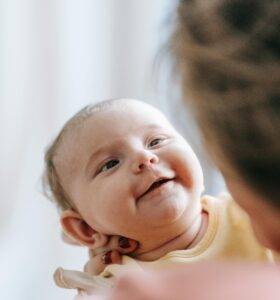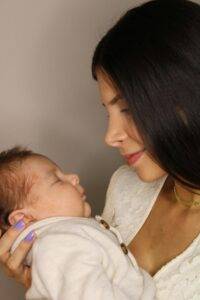The Magic Behind a Newborn’s Smile
Have you ever watched a newborn baby sleep and noticed their tiny, sweet smiles? It’s one of the most heartwarming sights and often leaves parents wondering, “Why newborn baby smile while sleeping?” This adorable phenomenon has fascinated parents and scientists alike.
This blog post will explore the reasons behind those delightful baby smiles and what they mean.
The Science of Newborn Sleep: A Peek into Their Dreams
Why newborn baby smile while sleeping? Newborns spend a significant amount of time sleeping. During these long naps, they go through different stages of sleep, much like adults do. One of these stages is called Rapid Eye Movement (REM) sleep, where the magic happens.
1. What Is REM Sleep?
REM sleep is characterized by rapid movement of the eyes, increased brain activity, and vivid dreams. REM sleep occurs in cycles throughout the night in adults, but in newborns, it takes up about half of their sleep time. This stage is crucial for brain development and growth, and the time that babies often smile.
During REM sleep, a baby’s brain is very active. This increased activity triggers facial muscles, leading to those sweet smiles. These are known as “endogenous smiles“, which means they’re generated internally rather than a response to an external stimulus. Essentially, these smiles are a part of the baby’s natural sleep cycle and brain development.
The Stages of Newborn Sleep
Understanding the different stages of newborn sleep gives us a clearer picture of why these smiles occur. Babies go through REM sleep and non-REM sleep. Non-REM sleep is deeper and consists of stages where the baby is restful. In contrast, REM sleep is lighter, and the brain is more active, leading to the facial movements that produce smiles.
The Importance of REM Sleep for Development
REM sleep plays a critical role in the development of the brain. During this stage, the brain processes information, essential for cognitive growth. The high level of brain activity during REM sleep is necessary for developing neural connections. Therefore, the smiles during this stage indicate that the brain is developing correctly.
2. Reflex Smiles: An Early Developmental Milestone
Another reason why newborn baby smile while sleeping is due to reflexes. Reflex smiles are involuntary and are one of the first smiles you’ll see in your baby. These are due to the baby’s developing nervous system, occurring during the first few weeks of life.
Reflex smiles aren’t necessarily a reaction to joy or happiness. Instead, they’re a sign that your baby’s brain is maturing and that their muscles are responding to signals. These early smiles are crucial for your baby’s development. They indicate that your baby’s brain works correctly and the nervous system functions as it should.
While reflex smiles aren’t a response to external stimuli, they pave the way for social smiles, which develop around six to eight weeks of age. As babies grow, reflex smiles diminish, paving for intentional, social smiles. These reflex smiles are important markers that show the baby’s nervous system is developing as expected.
Over time, parents will notice their baby’s smiles become more responsive to their environment, signaling the development of social and emotional connections.
3. The Role of Comfort and Contentment
Why newborn baby smile while sleeping? Newborns smile when they’re comfortable and content. While they might not be smiling at specific thoughts or memories like adults, their smiles signify a general sense of well-being.
- Comfort from Feeding and Swaddling: Babies feel secure and comfortable when well-fed, swaddled, and warm. This comfort leads to relaxed facial muscles, resulting in those adorable smiles. It’s a sign that your baby feels safe and satisfied.
- Mimicking Parental Expressions: Babies are natural mimics. Even in their sleep, they practice the facial expressions they observe from their parents and caregivers. These mimicry behaviors are essential in early development, helping babies learn and connect with the people around them.
- The Influence of Parental Interaction: Parental interaction plays a significant role in a baby’s comfort and happiness. The more a parent interacts with their baby through talking, singing, and making facial expressions, the more the baby will feel secure and content.
This interaction leads to more smiles, during sleep and when awake, as the baby feels a strong bond and sense of safety with their parents.
The Joy of Bonding: How Baby Smiles Strengthen Connections
While newborn smiles during sleep are often reflexive or related to brain activity, they play a significant role in bonding between parents and their babies.
- Smiles as Communication: Even though a newborn’s smiles during sleep aren’t deliberate, they’re still powerful forms of communication. When parents see their baby smile, it creates a positive feedback loop. Parents feel happy and more connected to their baby, and this emotional connection is crucial for the baby’s development and well-being.
- Encouraging Social Interaction: These early smiles, even if they occur during sleep, encourage parents to interact more with their babies. This interaction is vital for the baby’s emotional and social development. Babies learn a lot from these interactions, including how to express themselves and recognize emotions in others.
- Building Emotional Bonds: Smiling is one of the first ways that babies communicate with their parents. When a baby smiles, even in their sleep, it strengthens the emotional bond between the parent and the baby. This bonding is crucial for the baby’s development, helping them feel loved and secure.
The Evolution of Smiles: From Reflex to Social
As babies grow, their smiles evolve. Understanding this progression helps parents appreciate the stages of their baby’s development.
From Reflexive to Social Smiles: Initially, baby smiles are reflexive and happen mainly during sleep. However, as babies reach six to eight weeks of age, they begin to develop social smiles. These smiles respond to external stimuli, such as seeing a parent’s face or hearing a familiar voice.
The Impact of Social Smiles: Social smiles are a significant milestone in a baby’s development. They indicate that the baby is starting to engage with the world around them and recognize familiar faces. This is a crucial step in developing social skills and emotional intelligence.
Recognizing Social Smiles: Parents will notice their baby’s smiles more frequently and intentionally around the six to eight-week mark. These social smiles signify that the baby is beginning to understand their environment and react to the people around them. Recognizing and responding to these smiles help reinforce the baby’s social development.
The Role of Mirror Neurons: Mirror neurons play a vital role in social smiles. These specialized brain cells respond when a baby observes someone else acting, such as smiling. Mirror neurons help babies learn through imitation, a process essential for social and emotional skills development.
What Parents Can Do to Encourage Smiles
Parents play an active role in encouraging their baby’s smiles and overall happiness.
- Creating a Happy Environment: Ensure your baby’s surroundings are comforting and stimulating. Talk to your baby, play gentle music, and provide plenty of cuddles and affection. These actions create a sense of security and joy, which can lead to more smiles.
- Engaging in Play and Interaction: Spend time interacting with your baby. Simple activities like making funny faces, singing, and talking to your baby encourage them to smile and engage. Your baby is learning from every interaction, and these are building blocks for their social and emotional development.
- The Importance of Routine: Establishing a routine helps your baby feel secure and content. Regular feeding times, consistent bedtime routines, and a predictable daily schedule reduce stress and promote well-being, leading to more smiles.
The Psychological Benefits for Parents
Witnessing your newborn smile while they sleep has positive effects on parents too. These moments of joy reinforce the emotional bond between parents and their baby.
- Reducing Parental Stress: Seeing your baby smile significantly reduces parental stress. It’s a reminder that despite the challenges of caring for a newborn, your baby is content and happy. This boosts your mood and makes the demanding aspects of parenting feel more manageable.
- Enhancing Parent-Child Bonding: Smiles from your baby, even during sleep, can strengthen the emotional connection between you and your child. These moments create a sense of closeness and attachment, which is vital for your baby’s emotional security and development.
The Connection Between Baby Smiles and Overall Health
A smiling baby is often a healthy baby. Understanding the link between your baby’s smiles and their health provides valuable insights into their well-being.
- Monitoring Developmental Milestones: Regular smiling, while awake and asleep, signifies your baby is reaching developmental milestones. These milestones include developing vision, hearing, and social skills. If your baby smiles often, indicating they’re growing and developing as expected.
- Signs of a Happy, Healthy Baby: Aside from smiling, other signs of a healthy baby include regular feeding, consistent weight gain, and good sleeping patterns. Smiling indicates that your baby is experiencing less discomfort from common issues like colic or gas. Keeping an eye on these indicators helps your baby to be happy and thriving.
Encouraging Healthy Sleep Habits
Creating a conducive sleep environment for your newborn can enhance their well-being and potentially lead to more smiles.
Establishing a Routine: Consistent sleep routines are beneficial for babies and parents. Establishing a bedtime routine, such as a warm bath followed by gentle rocking, helps your baby relax and prepare for sleep. Over time, this routine promotes better sleep patterns and more opportunities for those sweet sleep smiles.
Safe Sleep Practices: Your baby’s sleep environment should be safe and secure. Place your baby on their back to sleep, use a firm mattress, and keep the sleeping area free from loose bedding or toys. Safe sleep practices protect your baby and provide peace of mind, allowing you to enjoy those precious smiles without worry.
Addressing Common Concerns
It’s natural for parents to have concerns about their newborn’s health and well-being, especially when it comes to sleep and behavior.
When to Seek Medical Advice: While smiles are signs of good health, monitor your baby for other unusual behaviors or symptoms. Consult your pediatrician if your baby has difficulty feeding, discomfort, or irregular sleeping patterns. Understanding the full range of your baby’s behaviors helps you ensure they’re developing normally.
Understanding Variability: Every baby is unique, some babies smile more than others. Variability in smiling patterns is normal and usually not a cause for concern. What’s important is that your baby is generally content, feeding well, and reaching other developmental milestones.
Resources for New Parents
Navigating the early stages of parenthood can be challenging. Fortunately, numerous resources are available to help you understand and support your baby’s development.
- Pediatrician Guidance: Regular visits to your pediatrician provide valuable insights into your baby’s health and development. Don’t hesitate to ask questions or discuss concerns about your baby’s sleep and behavior.
- Parenting Classes and Support Groups: Parenting classes and support groups offer learning opportunities from experts and connect with other parents. These resources provide practical advice and emotional support, helping you feel more confident in your parenting journey.
Marvel at the Beauty of Newborn Smiles
The phenomenon of newborn babies smiling while sleeping is a beautiful and fascinating part of early development. Whether these smiles are due to REM sleep, reflexes, comfort, or the beginnings of social interaction, they’re a heartwarming reminder of the innocence and joy of infancy.
As parents, cherishing these moments and understanding the reasons behind your baby’s smiles can deepen the bond. Every smile, whether during sleep or awake, is a precious sign of growth and connection. For more insights on newborn care and development, check out these helpful articles on Omega Pediatrics
- Helpful Tips to Put Your Newborn to Sleep so You Can Get Some Rest Too
- How Bassinets Help Reduce SIDS Risk: The Science Behind Safe Sleep for Babies
By delving into why newborn babies smile while sleeping, we can better appreciate these fleeting moments of joy. Keep observing, interacting, and enjoying every smile your baby shares, knowing that each smile is a step in their amazing journey of growth and development.







